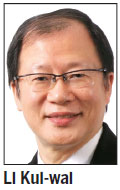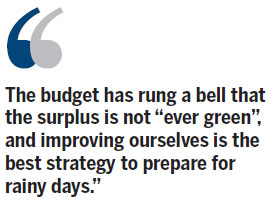Budget provides correct economic fundamentals
Updated: 2014-02-28 05:26
By Li Kui-wai(HK Edition)
|
|||||||||
The 2014-2015 Budget delivered by the financial secretary on Wednesday is definitely an improvement on the previous budget. One improvement is that welfare expenditure is contained to levels no more than those announced in the Policy Address by the Chief Executive. Sweeteners, such as reductions in rates and rental assistance to public housing tenants, have been cut compared with previous budgets. The second improvement is the chance of a long-term policy direction for the Hong Kong economy.
The economic fundamentals embedded in the budget are correct. First, given that the local economy is close to full employment, a mildly contractionary budget is appropriate as it should not fuel inflation. Second, given there is a fiscal surplus, expanding the future economic capacity of Hong Kong under the theme of competitiveness is the best we can do. Third, the budget warns about various conditions specified in the Basic Law on fiscal balance, and the need to avoid deficits by over-spending or excessive government spending.
On the question of economic competitiveness, the budget mainly focused on four areas. One is encouraging technological advancement by providing funds for R&D through various schemes which can be applied and used by corporations. More efforts will be made on additional land provisions, and a number of land reclamation sites have been identified. In regard to human capital provision, education will be the largest expenditure item. A number of specific provisions to secondary schools are also given. After being excluded from some budgets, the role of small and medium-sized enterprises has been revitalized. The budget provides new channels through which assistance could be provided to these enterprises.

The budget also touched on the need to make new free-trade agreements to strengthen and stabilize Hong Kong's exports on the one hand, and attract foreign businesses to the city, on the other. Although Hong Kong is an open economy, bilateral trade agreements have been popular in recent years to secure more investment, market access and exports. Given that Hong Kong has numerous economic advantages, it should strive for more free trade.
By and large, the budget aims to improve competitiveness through the resource end of the economic equation. By giving a fairly steady GDP growth rate projection, the government is playing safe. However, the business sector and the middle class probably would disagree about a lack of reduction in the tax rates, as the rates were raised during the economic recession years of 2002-04, and it is expected to revise downwards once the recession was over. The rise in tax rates that was thought to be temporary turned out to have lasted for a decade already. Indeed, the very instrument that raises economic competitiveness in Hong Kong is the lowering of both profit and salary tax rates.
There are also few uncertainties. Without major efforts to re-zone lands, one wonders how much land provision, including attempts to reclaim land, can effectively be used by the government. It is well-known that property prices have gone up so much that many young people cannot afford to buy their own homes. But a lack of long-term land provision will not satisfy home buyers. It is also likely the government may not want to have a "hard landing" in regard to property prices. The budget gives no clues on housing policy either, as there is much talk on the revitalization of the Home Ownership Scheme for sandwich households. With the housing market still biased toward private provisions, social discontent may remain. A well-structured formula for land provision and the housing market should be the pre-requisite for economic competitiveness.

The more controversial issue is establishing a "Future Fund", which would be geared to infrastructure spending in future if the fiscal surplus dries up. One question is whether this by-passes the need to have a balanced budget in accordance with the Basic Law? Another is what will this fund be used for and how large will it be? The idea of a "Future Fund" is acceptable as it really provides savings "for the rainy days". This is especially important in regard to the growing elderly population in future. There is thus a need for the government to elaborate more on the "Future Fund" to show how fiscally prudent our policy really is.
Overall, the 2014-15 Budget is definitely an improvement compared with previous ones. The focus has been on developing economic advantages for Hong Kong. The instruments used are appropriate and apolitical. This should give clear signals to investors and local households that there is still work to do. We should not be complacent with our current situation. Welfare provision represents "dead-end" expenditures as they will not give rise to further economic activity. By promoting technology, education and small businesses, people in Hong Kong should see the "light at the end of the tunnel". The economic future will improve as our capacity is enlarged.
While the financial secretary has rightly outlined a suitable direction for the Hong Kong economy, it will remain to be seen if the business sector and individuals in Hong Kong will cooperate. At least, the budget has rung a bell that the surplus is not "ever green", and improving ourselves is the best strategy to prepare for rainy days.
The author is associate professor of the Department of Economics and Finance at City University of Hong Kong.
(HK Edition 02/28/2014 page9)